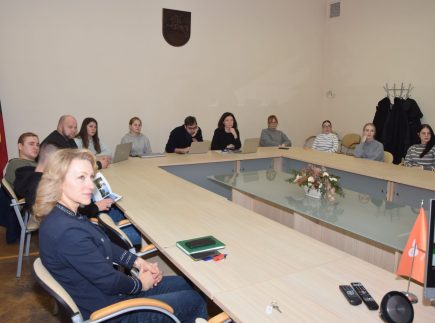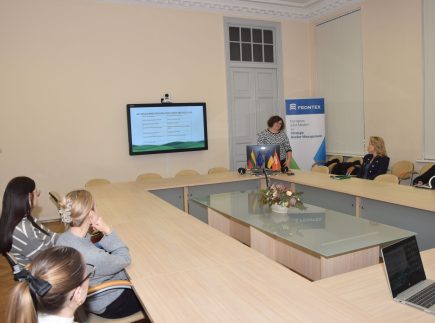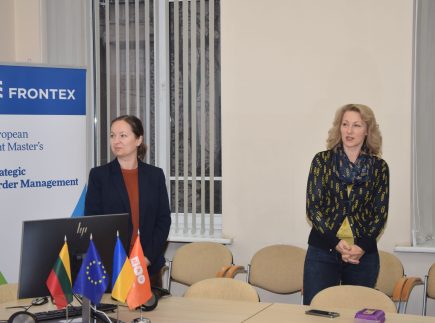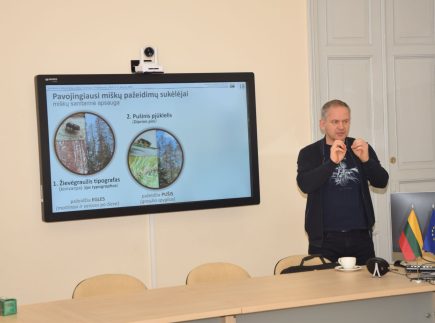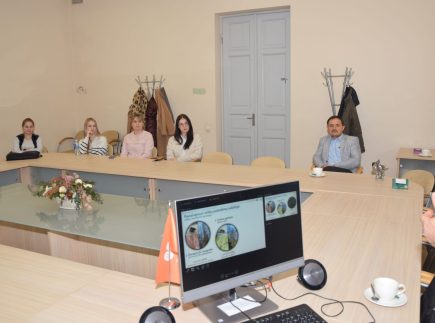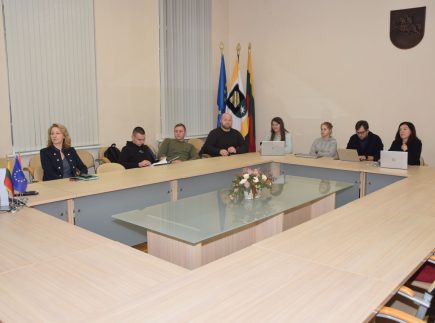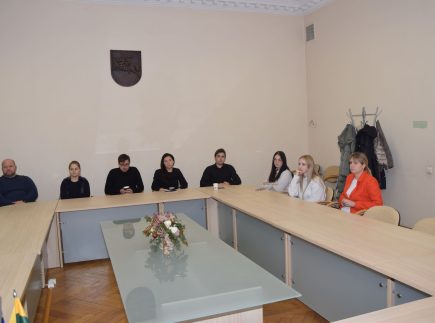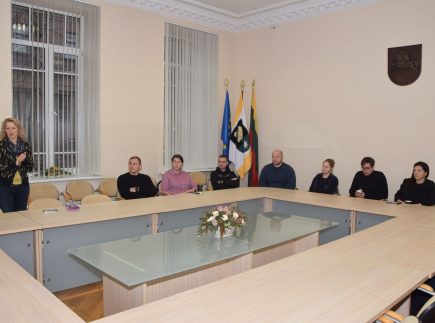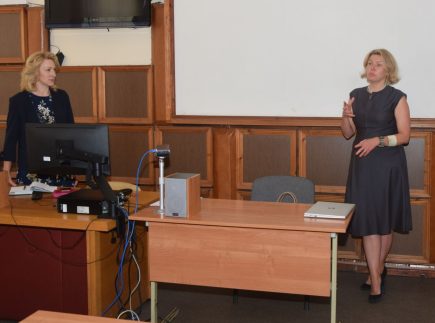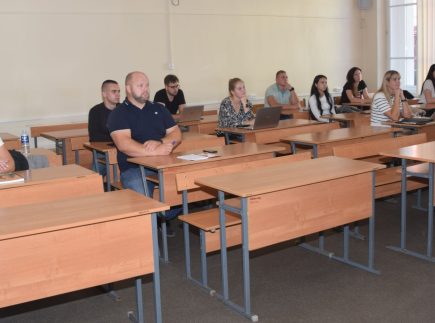
From September to November, the Public Security Academy (PSA) of Mykolas Romeris University (MRU) organised eight roundtable discussions for students on various environmental law topics. The discussions were moderated by PSA Professor Dr. Birutė Pranevičienė, and a range of environmental law experts were invited to share their knowledge and experience.
Legislation as a Key Tool in Implementing Environmental Protection Policies
Greta Česnaitytė, Senior Advisor at the Waste Policy Group of the Ministry of the Environment of the Republic of Lithuania and a PSA alumna, presented the structure of the Ministry, its main areas of activity, and discussed the daily operations within the Ministry. She focused on both national and EU-level legislation, as well as issues related to the review of complaints and requests, and solving ad hoc problematic situations. The discussion developed into a meaningful exchange regarding the legal regulation of waste management.
Legal Regulation and Issues of Textile Waste Management
Environmental law graduate Santa Klimavičiūtė presented the results of scientific research analyzing the legal system for textile waste management and its compliance with EU regulations. The discussion delved into the compatibility of national laws regulating textile waste management with EU law, particularly in light of European Commission targets to reduce waste and promote recycling. Practical issues of textile waste management were also discussed.
The Role of the Environmental Protection Committee in the Legislative Process
PSA alumna Aistė Vieraitytė shared valuable insights from her work in the Parliament of Lithuania of Environmental Protection Committee, one of the key institutional bodies shaping environmental policy in Lithuania. The discussion covered recent amendments and reforms in environmental law, both passed and planned for the near future. A. Vieraitytė also shared her academic work and personal experience in volunteering with animal welfare organizations. The discussion highlighted the importance of environmental law professionals and their impact on both the public and private sectors, showing how legislation can contribute to creating a more sustainable and responsible society.
Protecting Public and Private Interests in Forest Use and Management
Žydrūna Damulytė, Head of the Legal Department of the State Forests Enterprise, presented the specifics of the enterprise’s operations, its legal foundations, and the issues arising in forest management, along with current judicial practices. She discussed one of the main challenges in legal regulation: reconciling various interests, both public and private. The forest management system must comply with strict legal norms governing forest protection, logging, replanting, and other forest-related activities, while also ensuring the protection of private interests, particularly concerning land ownership, forest use, and investments. The discussion with Ž. Damulytė provided valuable insights into the work of the State Forests Enterprise and the legislative processes in forest management.
Current Issues in Forest Management
Dr. Albertas Kasperavičius, Director of the State Forest Service, and Gintaras Kulbokas, Head of the National Forest Inventory Department, presented the activities of the State Forest Service. The discussion focused on the forest management system, decision-making processes, and issues such as clear-cutting, which often elicits controversial public reactions. Forest management in Lithuania is crucial, as it intersects not only with environmental goals but also with economic and social interests. The experts discussed how legal decisions in this area balance these various interests and their impact on nature and society.
The Role of National Public Health Center in Creating a Health-Conducive Environment
Kristina Baltrušaitienė, a representative from the National Public Health Center (NVSC) under the Ministry of Health, presented the organization’s work, detailing its areas of focus on odor and noise control and their impact on public health. The discussion explored the strategies for managing the threats posed by these environmental factors, how NVSC conducts investigations into complaints, analyzes their causes, and collaborates with the Environmental Protection Department. The latest NVSC projects aimed at noise and odor prevention were also discussed, alongside collaboration with other institutions to ensure effective and sustainable environmental protection. The discussion included practical examples of how NVSC addresses these issues at the local and regional levels, giving students a better understanding of how theoretical knowledge is applied in real-world situations.
Legal Regulation of Protected Areas
Žydrė Stirbienė, Head of the Legal and Personnel Department at the State Service for Protected Areas under the Ministry of Environment, presented the service’s activities and explained how the protection of protected areas and their legal regulation is organized in Lithuania. The discussion analyzed Constitutional Court rulings relevant to the activities of the Service for Protected Areas. Ž. Stirbienė answered students’ questions and shared valuable experience in the creation and implementation of Lithuania’s legal system for protected areas. After the discussion, the Public Security Academy was presented with a book that will enrich the library and serve as a valuable resource for students.
The Role of the Environmental Protection Department in Implementing State Control
Lina Stulginskienė, Senior Specialist at the Kaunas Environmental Protection Inspectorate of the Environmental Protection Department (PSA alumna), and Senior Specialist Donatas Mikelskis discussed current issues in environmental state control and answered students’ questions. Topics included the control of pollutant vehicles, historical pollution, the removal of its effects, and plant protection control. Prof. Dr. Birutė Pranevičienė emphasized that such discussions not only enrich students' knowledge but also foster an open dialogue between the academic community and expert practitioners. “I hope that in the future, we will have more opportunities to deepen knowledge and exchange experiences,” she added.
